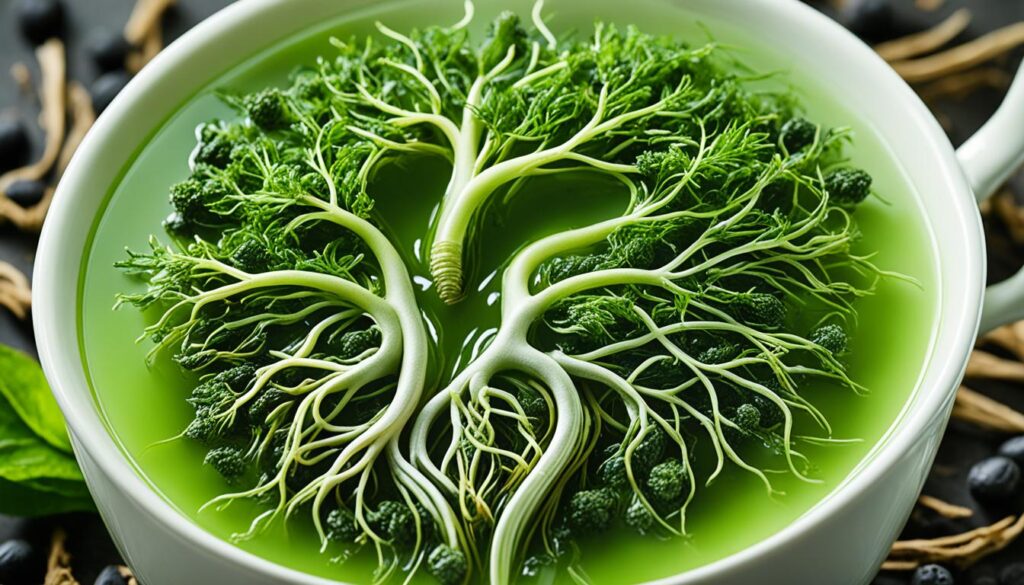If you’re seeking ways to boost your well-being, look no further than the time-honoured cup of green tea. Beyond its comforting warmth, this beverage holds a wealth of health benefits of green tea, making it a favourite among health enthusiasts worldwide. Rich in antioxidants and noted for its immune-boosting properties of green tea, this simple infusion offers more than just a refreshing taste.
Savouring green tea regularly could make a considerable difference to your health, with studies suggesting numerous gains ranging from sharpened mental acuity to potential weight management attributes. Its storied reputation as a health-promoting drink is backed by a growing body of scientific evidence, making it a worthy addition to your daily regimen.
Key Takeaways
- Green tea is a powerhouse of antioxidants like polyphenols which can prevent cellular damage.
- Enhanced cognition and memory function are among the recognised benefits of green tea.
- Regular consumption might contribute to a lower risk of certain cancers due to its antioxidant content.
- The health benefits of green tea extend to fat metabolism, especially when paired with exercise.
- Green tea’s constituents are explored for their roles in oral health, though more research is needed.
- Consuming green tea may be linked to a reduced likelihood of cognitive impairment, especially in older adults.
Unveiling the Antioxidant Properties of Green Tea
When you savour a cup of green tea, you’re not just indulging in a warming beverage; you’re also fuelling your body with antioxidant properties that may play a crucial role in your wellbeing. The benefits of green tea start with an impressive cohort of molecules known as polyphenols, specifically a type of catechin called epigallocatechin-3-gallate (EGCG).
These polyphenols are like your body’s own personal defence agents, targeting and neutralizing free radicals – those unruly molecules that cause oxidative stress and can lead to chronic diseases. The capacity of green tea to minimise oxidative damage is at the heart of its health-promoting reputation.
- EGCG and Cell Protection: A Potent Polyphenol
- Oxidative Stress Reduction: Combatting Free Radicals
- Cancer Risk Reduction: Potential Links to Green Tea
As you sip on green tea, you can imagine the EGCG going to work, providing a layer of protection that may help keep cells healthy and functioning correctly. The relationship between green tea and cancer risk reduction, especially in types like lung and ovarian cancer, is an exciting area of research. While not yet conclusive, the growing body of evidence suggests we’re on the verge of understanding even more profound green tea benefits.
Scientific studies suggest that the antioxidant properties of green tea may have far-reaching implications for our health, potentially laying the groundwork for future therapeutic uses.
While we await further research to provide high-quality evidence of these effects, exploring the world of green tea and its myriad compounds is both promising and invigorating.
Remember, the enjoyment of green tea goes beyond its refreshing taste; it’s about nurturing your body with nature’s elixir. Whether pursuing general health or seeking specific benefits, keeping a keen eye on future discoveries related to the polyphenols in green tea just might prove beneficial for your lifelong health journey.
A Closer Look at Green Tea for Brain Health
Exploring the realms of natural brain enhancers brings us to a remarkable beverage: green tea. Renowned not only for its subtle flavour profiles but also for its profound impact on cognition, green tea has been a focus of numerous studies regarding mental acuity and neural protection. As you sip your next cup, consider the intricate dance of compounds that may be conferring benefits on your brain’s health.
The Cognitive Connection: How Green Tea May Enhance Memory and Attention
There’s a reason green tea is often touted in conversations about cognitive function and memory. With its duo of caffeine and L-theanine, it’s no surprise that green tea memory enhancement is an area of avid interest. This synergistic combination has become known for its potential to fine-tune your mental focus while softening the oft-jittery side effects of caffeine alone.
- Memory Enhancement: Research suggests that the regular consumption of green tea may improve aspects of memory and attention in individuals.
- Focus & Mood: The L-theanine in green tea is known to promote relaxation without drowsiness, potentially improving mood and the ability to concentrate.
- Neuroprotective Effects: Polyphenols, particularly EGCG, may exert a protective influence over neural pathways, thus enhancing brain health over time.
Into Old Age: Green Tea’s Potential in Protecting Against Neurodegenerative Diseases
The twilight years need not be dimmed by the shadow of neurodegeneration. Emerging studies on neurodegenerative protection with green tea reveal a glimmer of promise in combating diseases like Alzheimer’s. While these findings are preliminary, they carve a potential path towards a better understanding of how natural compounds can assist in preserving mental faculties as one age.
“Green tea constituents, such as EGCG, succeed in drawing a line of defence against neurodegenerative disorders, offering a beacon of hope in the battle to safeguard our cognitive longevity.”
With ongoing research, the benefits of green tea could make a significant impact on how society approaches brain health and the preservation of cognitive functions. So, as you cherish the warmth of your mug, you might also be cradling a sort of elixir for your mind—an easily accessible adjunct to a lifestyle that cherishes and protects brain health.
Benefits of Green Tea for a Trim and Toned Physique
Exploring the realm of weight management, one cannot overlook the influence of green tea in sculpting a leaner silhouette. As you relish each sip, let’s delve into the dynamic role green tea plays in fostering weight loss and abdominal fat reduction, making it a revered ally in your journey towards a trimmer and more toned physique.
Fat Burning and Metabolism: Can Green Tea Give You the Edge?
Whether you’re embarking on a rigorous workout routine or simply seeking a metabolic boost, green tea emerges as a promising addition to your diet. Infused with the potential to enhance fat burning and accelerate your metabolic rate, green tea might just be the edge you seek. Various studies have documented its ability to complement exercise-induced fat loss, attributing this power to the thermogenic properties of its catechins.
While green tea isn’t a magical elixir for drastic weight loss, its consistent intake, especially pre-exercise, can contribute to increased calorie expenditure. In translation, that’s more energy utilised and a fat-burning advantage that supports your weight management endeavours within a balanced lifestyle framework.
Targeting Abdominal Obesity: Insights from Recent Studies
Abdominal obesity, a stubborn adversary for many, is often resistant to conventional dieting and exercising. However, green tea stands out with its notable reduction in abdominal obesity, especially noteworthy in studies focusing on female subjects. The compound’s impact on visceral fat paves the way for not just aesthetic enhancement but also improved health outcomes, as this fat type is linked to numerous metabolic diseases.
The regular consumption of green tea, sometimes to the tune of four or more cups daily, has been correlated with smaller waist circumferences and lower abdominal fat percentages. These findings underscore green tea’s role in a scientifically anchored approach to reshaping your body composition gently and progressively.
In summarizing the researched benefits, consider the following comparison:
| Weight Management Aspect | Without Green Tea | With Green Tea |
|---|---|---|
| Fat Burning Efficiency | Standard | Enhanced |
| Metabolic Rate | Normal | Increased |
| Reduction in Abdominal Fat | Varies Widely | Potentially Greater in Women |
| Daily Caloric Expenditure | Unchanged | Slightly Higher |
Ultimately, while the influence of green tea on satiety hormones remains an area ripe for further study, its multifaceted role in weight loss with green tea and especially the reduction in abdominal obesity cements its standing as a worthwhile companion in your weight-loss journey.
Heart Health and Green Tea: A Heartening Connection
Exploring the role of green tea in heart health reveals some truly encouraging findings for those seeking natural methods of heart disease prevention. The compounds found in green tea, notably flavonoids and catechins, have been shown to provide significant green tea blood pressure benefits, potentially reducing the risk factors that lead to cardiovascular issues.

Studies have indicated that the habitual intake of green tea can aid in maintaining a healthy circulatory system. Here’s a deep dive into how green tea interacts positively with our heart’s health:
- Antioxidant Activity: Antioxidants in green tea, such as polyphenols, combat oxidative stress, which is known to damage blood vessels and lead to heart disease.
- Cholesterol Management: Regular green tea consumption is associated with lower levels of LDL (bad) cholesterol and higher levels of HDL (good) cholesterol.
- Improved Arterial Function: The endothelial function of arteries improves with green tea, which means better blood flow and lower propensity for clot formation.
It’s fascinating to note that the influence of green tea on blood pressure has been the subject of many studies. A meta-analysis of randomised controlled trials shows that green tea consumption can lead to significant reductions in systolic and diastolic blood pressure. Let’s compare some related health parameters affected by green tea in the table below:
| Health Parameter | Effect of Green Tea Consumption |
|---|---|
| Systolic Blood Pressure | Reduction |
| Diastolic Blood Pressure | Reduction |
| Total Cholesterol | Decrease in Levels |
| LDL Cholesterol | Decrease in Levels |
| HDL Cholesterol | Potential Increase in Levels |
| Triglycerides | Reduction |
While the heart-health advantages of green tea are compelling, it should be noted that a consistent, well-rounded diet and lifestyle are imperative for optimal cardiovascular health. Including green tea as part of your daily routine could be a delightful and beneficial habit, given its association with a lower risk of heart disease. However, always remember that moderation is key, and it’s vital to consult healthcare professionals before making significant changes to your diet, especially if you have pre-existing health conditions.
Green Tea’s Influence on Longevity and Disease Prevention
Sipping on a cup of green tea might be more than just a refreshing experience; it could also be a step towards a healthier, longer life. Studies have continually supported the notion that green tea for longevity isn’t merely folklore, but indeed, it carves a path for lifespan extension and robust health. With its origins rooted in ancient wellness practices, green tea today emerges at the forefront of disease prevention with green tea.
Lifespan Extension: The Role of Green Tea in Enhancing Longevity
Are you seeking a natural ally in your quest for a longer life? Green tea could be your companion. The brew that’s steeped in history is also steeped in benefits for extending your lifespan. The connection between green tea consumption and a reduction in mortality rates is no coincidence. Compounds within this potent leaf, such as catechins, have been connected to not only promoting longevity but also enhancing the quality of life as you age.
Combatting Chronic Illness: Green Tea’s Protective Mechanisms
Chronic illness reduction is not something to be taken lightly, and green tea has stepped up as a significant contender in this arena. It’s time to steep yourself in the knowledge of the green tea health benefits that encompass a spectrum of preventive potentials, from cardiovascular protection to anti-inflammatory effects. Delve into the myriad of ways this ancient elixir can reinforce your defences against the chronic diseases that are increasingly prevalent in modern life.
Let’s table the conversation on these preventive wonders. Here’s a look at the health areas where green tea’s prowess shines:
| Health Area | Preventive Role of Green Tea |
|---|---|
| Cardiovascular Health | Manages blood pressure and reduces cholesterol levels |
| Diabetes | May decrease the risk of death from type 2 diabetes |
| Stroke Prevention | Potentially reduces risk with improved heart health |
| Alleviation of Inflammation | Ameliorates signs of inflammation and aging |
In your everyday cup, you’re not just enjoying a moment of green tea for relaxation; you’re engaging in a centuries-old tradition that now carries the backing of modern science.
As you appreciate the delicate flavours of green tea, consider the multitude of ways in which it’s not only soothing your mind but also fortifying your body against the trials of time. Embrace the essence of health in every sip and ponder the powerful yet gentle touch of green tea on your longevity. It’s not a cure-all, of course, but it’s a piece of the puzzle to a more vibrant, healthier you.
Conclusion
The benefits of green tea are vast and varied, making it an excellent contender for enhancing your daily health regimen. With its profound antioxidant properties, green tea is not just a refreshing beverage but a potent means of fortifying your body against the stresses of modern life. Whether you’re aiming to manage diabetes, bolster cognitive functions, or support cardiovascular health, green tea health advantages play an instrumental role in empowering your wellness journey.
While the infusion of green tea into your diet promises a bevvy of healthful gains, it’s important to remember that moderation—and a balanced lifestyle—is key. Despite the need for further evidence on some health claims, incorporating green tea into your diet can complement existing health strategies, potentially contributing to overall longevity and well-being. Plus, with its diverse application in both hot and cold recipes, green tea adds not only a healthful boost but also a versatile flavour.
So, whether you’re looking to invigorate your mornings with a steaming cup or cool down with an iced concoction, consider making green tea a staple in your dietary pattern. Its rich history and current scientific backing present a compelling narrative for those seeking a natural, wellness-centric addition to their daily intake.
FAQ
What are some of the health benefits of green tea?
Green tea is known for its multitude of health benefits, such as boosting your immune system, aiding in weight management, enhancing cognitive functions, and providing a rich source of antioxidants that protect against cellular damage and reduce the risk of chronic diseases.
How do the antioxidant properties of green tea contribute to my health?
The antioxidants in green tea, particularly polyphenols and catechins like EGCG, scavenge harmful free radicals, reduce oxidative stress, and can lower the risk of several chronic illnesses, including some forms of cancer and heart disease.
Can green tea improve brain health?
Yes, the bioactive components in green tea, such as caffeine and L-theanine, work together to enhance memory, mood, and overall brain function. They also show potential in protecting against neurodegenerative diseases like Alzheimer’s over the long term.
Is green tea effective for weight loss and metabolism?
Green tea has been recognised for its capacity to enhance fat burning and increase metabolic rate, which can aid in weight loss efforts, especially when combined with exercise. However, the effects may be modest and should be part of a comprehensive weight management strategy.
How does green tea affect heart health?
The compounds in green tea are associated with lower risk factors for heart disease, such as reducing high blood pressure and improving lipid levels. Regular consumption is correlated with a decreased risk of heart conditions, though more long-term studies are needed to confirm these effects.
Can drinking green tea increase my lifespan?
Studies suggest that higher consumption of green tea could be linked to a reduced risk of all-cause mortality, including for those with a history of heart attacks or strokes. The antioxidants and protective compounds in green tea may contribute to its lifespan-extending properties.
Does green tea help in preventing chronic illnesses?
Yes, green tea has shown promise in combating chronic illnesses through its anti-inflammatory effects, regulation of blood pressure and cholesterol, and potential lowering of the risk of type 2 diabetes mortality. Its rich antioxidant profile is key to these health benefits.
How can I incorporate green tea into my diet for maximum health benefits?
You can enjoy green tea by drinking a few cups daily, either hot or cold. It can also be used in recipes such as smoothies or desserts. To harness the full spectrum of its health benefits, make it a regular part of your balanced diet and lifestyle.





